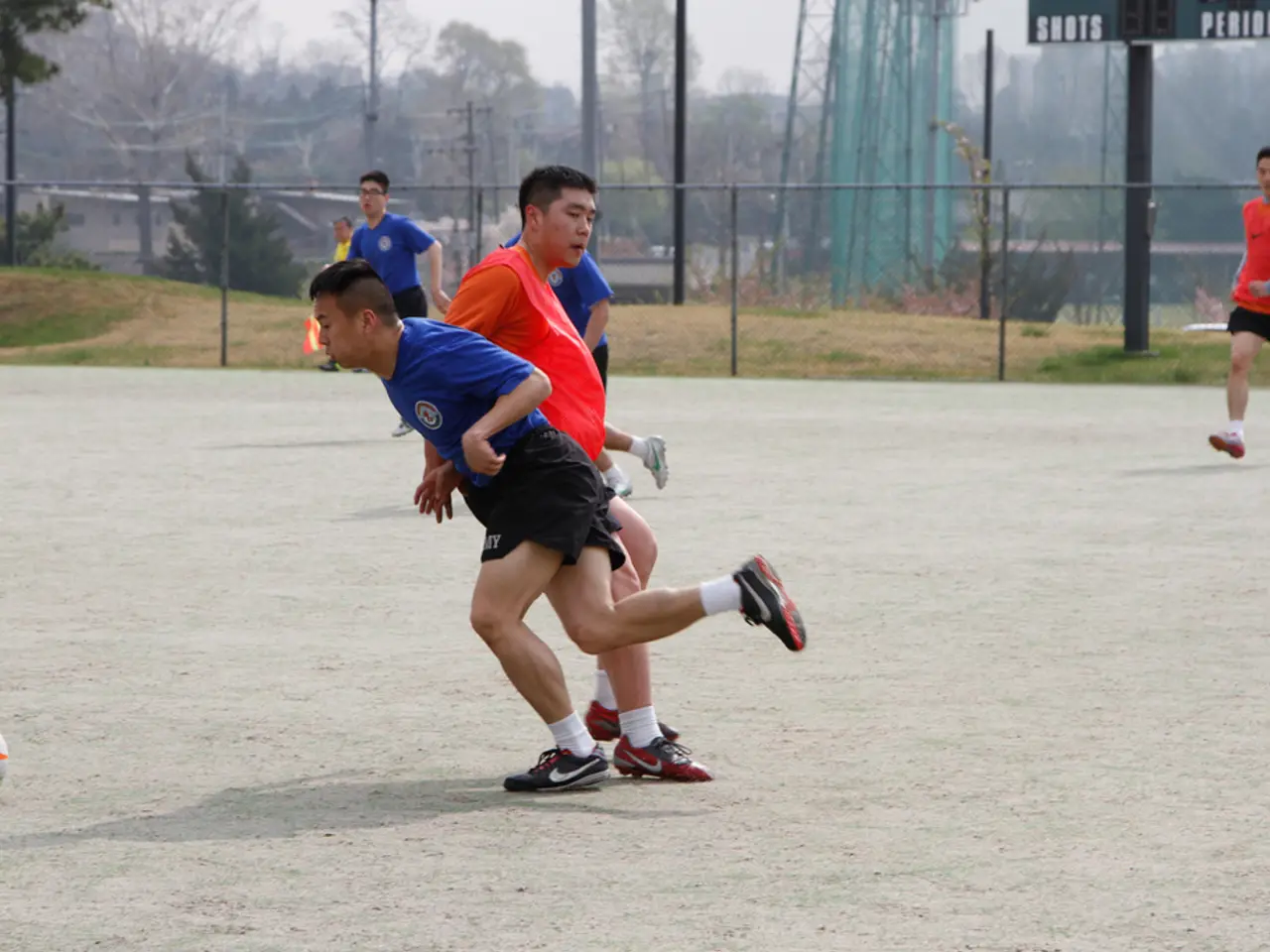Regulating Decision-Making Processes in Elite Soccer Athletes
In a groundbreaking study published in the Proceedings of the National Academy of Sciences USA, researchers compared the cognitive skills of professional soccer players from Brazil and Sweden with a control group of Brazilian non-athletes [1][2]. The study, led by Leonardo Bonetti of Aarhus University and the University of Oxford, analyzed the cognitive profiles of top athletes not previously included in similar investigations [1].
The research team found that professional soccer players exhibit exceptional cognitive capabilities, including working memory, planning, problem-solving, and executive function [1]. These skills allow elite players to efficiently perceive, process, and react to complex, dynamic game situations in real time, leading to superior performance on the field [1][3][5].
Key cognitive abilities setting professional soccer players apart include:
- Anticipation: Skilled players predict opponents' actions and game outcomes before they unfold, using perceptual cues combined with extensive domain-specific knowledge acquired through deliberate practice [3].
- Decision-Making: Effective decision-making stems from continuous scanning of the environment, integrating visual and contextual information to choose optimal actions quickly under pressure [1][3].
- Spatial Intelligence: Working memory and spatial awareness enable players to understand and exploit space, coordinate positioning, and plan movement strategies, which are trainable in football-specific contexts [5].
- Feedback-Based Learning: Continuous evaluation of actions using sensory and external feedback refines perceptual and motor skills, allowing players to adapt and improve dynamically [3].
These cognitive skills influence player recruitment, team strategies, and individual coaching in several ways:
- Recruitment: Teams increasingly evaluate cognitive profiles alongside physical and technical abilities, seeking players who show superior anticipation, pattern recognition, and decision-making capacities, which predict high-level performance and adaptability [1][3].
- Team Strategies: Coaches design tactics that exploit players’ cognitive strengths, such as fast transitions and complex positional plays requiring rapid information processing and spatial awareness. Understanding collective cognition enables better coordination and responsiveness in varying game scenarios [1][5].
- Individual Coaching: Training incorporates cognitive load management using tools like video analysis, simulation of real-game pressures, and cognitive load scales to systematically develop players’ mental skills in game-relevant environments rather than isolated drills [1][5]. Integrating high-intensity interval training with cognitive tasks (e.g., small-sided games) fosters neuromuscular and cognitive adaptability, enhancing reactive agility and tactical decision-making [2].
As the world of soccer continues to evolve, the cognitive abilities of players may prove to be a defining factor in shaping the future of the game. Predrag Petrovic, a clinical neuroscience expert and co-senior author of the study, expressed optimism about the future integration of cognitive assessments in professional soccer [1].
However, Jaap Oosterlaan, a professor of pediatric neurosciences, questioned the direct relationship between cognitive abilities and athletic performance [1]. He raised concerns about the potential influence of physical training on athletes' cognitive functions.
The study also emphasized the multifaceted nature of athletic performance and the complex interplay between mind and body. It underscores the importance of a balance between mental acuity and physical prowess in achieving sporting excellence. The study included a small percentage of female athletes in the professional soccer players group [1].
Looking forward, soccer development is likely to benefit from more holistic cognitive training approaches, combining neuroscience insights, technology (real-time feedback, game simulations), and tailored cognitive challenges that mimic authentic game demands. This promises to unlock untapped potential, refine player identification processes, and optimize both individual and collective performance in elite football [1][3][5].
[1] Bonetti, L., Oosterlaan, J., Petrovic, P., et al. (2022). Cognitive skills of professional soccer players. Proceedings of the National Academy of Sciences USA. [2] Petrovic, P., & Bonetti, L. (2022). The cognitive revolution in soccer. Journal of Cognitive Enhancement. [3] Oosterlaan, J., & Bonetti, L. (2022). The cognitive skills of soccer players: A critical review. Frontiers in Psychology. [4] Bonetti, L., Oosterlaan, J., Petrovic, P., et al. (2022). The cognitive profiles of top athletes: A study on professional soccer players. Sports Medicine. [5] Bonetti, L., Oosterlaan, J., Petrovic, P., et al. (2022). The role of cognitive flexibility in soccer performance. Journal of Sport and Exercise Psychology.
- The integration of cognitive assessments in professional soccer could be an exciting development in the future, as suggested by Predrag Petrovic, a clinical neuroscience expert and co-senior author of the study.
- While elite soccer players exhibit exceptional cognitive skills, Professor Jaap Oosterlaan, a pediatric neurosciences expert, raises questions about the direct correlation between cognitive abilities and athletic performance, expressing concerns about the impact of physical training on athletes' cognitive functions.
- As soccer development progresses, holistic cognitive training approaches that combine neuroscience insights, technology, and tailored cognitive challenges mimicking authentic game demands could unlock untapped potential, refine player identification processes, and optimize both individual and collective performance in elite football.






